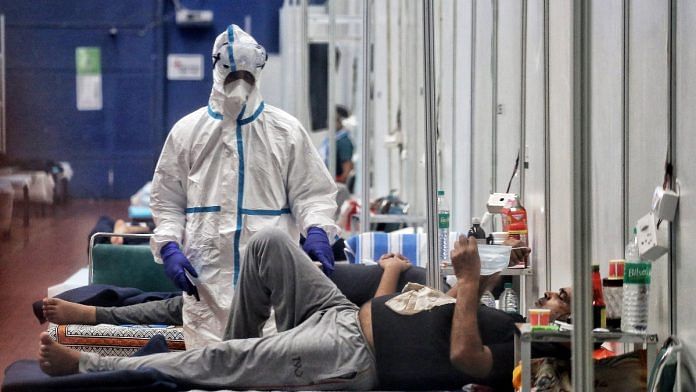New Delhi: Hospitals across New Delhi are continuing to keep hundreds of beds for Covid-19 patients on standby, even though most are going empty, leading to concerns over wastage of resources.
Of the 5,711 Covid-19 beds across all government and private hospitals in the capital, only 516 — or 9 per cent — are occupied as on 2 March, according to the Delhi Fights Corona app set up by the Delhi government.
“The beds for Covid have been taken from various departments, and they’re now lying empty. We have so many patients, who can be benefitted from those beds, but we have to refer them elsewhere because of lack of space,” said a doctor at RML Hospital, who did not wish to be named.
Of the RML’s 1,504 beds, 182 have been reserved for Covid patients, and only 12 are in use.
“We have requested the government to release 100 more beds for non-Covid patients, since occupancy among Covid patients is very low. We had zero occupants Thursday, which is a cause for celebration, but we feel some more beds can be released for non-Covid use,” Dr B.L. Sherwal, director of Rajiv Gandhi Super Specialty Hospital where 500 beds are reserved for Covid, told ThePrint.
As on 1 March, only one of the 500 beds was occupied at this hospital.
“Empty beds means we are prepared for a surge in case it comes, but we feel we can afford to allocate some more for non-Covid use,” Sherwal added.
The allocation for Covid-19 beds for government hospitals is dealt with by both the Delhi and central governments on a case-by-case basis.
Various hospital administrators told ThePrint that hospitals can make appeals to the government directly to free up more beds.
Also read: As states see Covid surge, cautious Delhi to adopt cluster-based genome sequence testing
How govt hospitals are managing
Cases in the city have declined significantly since November 2020, when Delhi went through what appeared to be a second wave. On Sunday, Delhi registered 197 cases with a positivity rate of 0.3 per cent.
Occupancy of Covid-19 beds has somewhat followed this trend, said hospital doctors, adding that keeping a buffer in case of another surge is necessary.
“Cases have been low over the last month, and so we have reduced bed capacity since occupancy has also dropped. We now have around 80-odd beds, most of which are for patients seeking admission whose reports are yet to come,” said Dr N.N. Mathur, director of Lady Hardinge Medical College.
The hospital has 12 beds reserved for Covid-19 patients, of which one is occupied.
“For us, it is not about the number of beds but space allocated. We have cut down on space for Covid patients, and we are able to treat non-Covid patients comfortably. A minimum area has to be kept so we are prepared if cases rise”, Mathur added.
Lok Nayak Jai Prakash (LNJP) Hospital, which was once the city’s largest Covid-19 facility with 2,000 beds exclusively for Covid patients, was allowed to transition back to regular services starting 1 January after the Delhi government passed an order releasing a portion of beds for non-Covid patients.
Now, only 300 beds are reserved for Covid patients, 20 of which are currently occupied.
“We have to keep certain beds aside in case there is a surge, which can happen at any time. Most of our non-Covid services have started and we are able to cater to everyone’s needs,” said Dr Suresh Kumar, director of LNJP Hospital.
A doctor from Safdarjung Hospital, who did not wish to be named, said the hospital was planning on reallocating beds for non-Covid use to ease the “backlog” of other patients.
“We have a tremendous workload of new and old patients. The hospital is planning on reallocating beds for non-Covid use. It would definitely be a benefit to the departments,” he said.
Cost of empty beds hits private hospitals too
Private hospitals are also faced with the predicament of empty beds.
In January 2021, the Delhi government ordered that for hospitals with over 100 beds, 15 per cent of ward beds and 25 per cent ICU beds had to be reserved for Covid cases.
“We have managed so far, but a lot of our beds are going empty. Even non-Covid patients are not coming, so our clientele has reduced significantly. Our OPD (out-patient department) has gradually increased to 200 or so patients,” said Dr S.C.L. Gupta, medical superintendent of Batra Hospital.
Dr Dhiraj Malik, medical superintendent of Saroj Specialty Hospital, said the cost of empty beds was alarming.
“Our occupancy right now is at less than 50 per cent, including Covid patients. Apart from beds, there is staff, doctors, medical equipment — recovery is not possible,” Malik said, adding, “We cannot close any services either … OT (operation theatre) and OPD must remain open, so it’s a difficult time for us.”
Also read: Good news from Delhi — Covid cases & fatalities see decline in 2021, 90% hospital beds vacant



